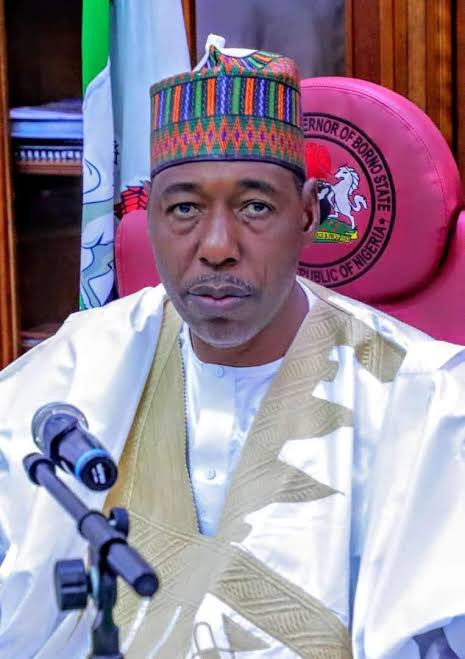
By Sadiq Abubakar
Maiduguri
Though Boko Haram insurgency, now in its 11th year, has practically wiped off economic activities in 20 out of its 27 local government areas (LGAs), Borno State grew its internally generated revenue by 25.3% from N6.52 billion in 2018 to N8.17 billion in 2019.
This was disclosed yesterday in Maiduguri, by Alhaji Ali Manga Bulama, Executive Chairman of Borno State Internal Revenue Service, when an Excellence in IGR Award 2019/2020 was presented to him by Alford Conferences Limited, the convener of the annual Nigerian States IGR Summit.
At the award presentation, Alhaji Bulama said, “In 2019, we were able to collect revenue mainly in Maiduguri metropolis and to some extent in six additional local government areas: Jere, Bayo, Shani, Kwaya Kusar, Hawul and Biu. The situation has remained pretty much the same even in the previous years. Though the continuing insurgency has taken a huge toll on lives and economic activities in the state, we have continued to seek and deploy creative ways to collect taxes and other revenue so that the state can keep operating financially.”
Bulama explained further that, “Trans-border trade between Nigeria and its neighbouring countries of Niger, Chad and Cameroon has also been grounded due to the insurgency. Borno is the only state in the country that shares borders with three countries, and this trans-border trade was an important part of the economy of our economy for several years and decades.”
“Though we currently face great limitations in revenue collections, Borno State remains the pillar when you look at the economy of the entire North East zone of the federation. And, on a positive note, I must thank our state governor, Prof. Babagana Umara Zulum, for his raw determination to bring Borno State back to stability and normalcy, even at a great risk to his own life.”
“Still on a positive note, let me inform those outside the state and outside the country that Maiduguri, the state capital, has confidently bounced back to life, after the many years that it suffered all kinds of internal strife leading to loss of lives and valuable property.”
While presenting the Excellence in IGR Award to Borno State, Mr. Frederick Apeji, representing the convener of Nigerian States IGR Summit, said, “We are gathered here today to honour Alhaji Ali Manga Bulama, the Executive Chairman of Borno State Internal Revenue Service, a taxation professional of over 30 years, who has produced many victories in the internally generated revenue (IGR) of Borno State, despite the challenges that his agency faces on a daily basis. Specifically, we commend Alhaji Bulama and his team for growing the internally generated revenue (IGR) of Borno State by 25.3% from N6.52 billion in 2018 to N8.17 billion in 2019.”
While formally receiving the Class of 2019 State Governors in Nigeria in 2019, the Vice President of the country, Prof. Yemi Osinbajo, charged them to explore ways of improving their internally generated revenue (IGR) in the next few years.
In his words, “It was possible for states to generate significant revenues from agriculture. After all, the mind boggling achievements of the regions in our history were without oil money, but mainly from agriculture and taxes.”
In 2019, 34 states in Nigeria, including Borno, depended on the Federation Account for more than 50% of their entire revenue. Last month, the Chairman of the Revenue Mobilization Allocation and Fiscal Commission (RMAFC), Engr. Elias Mbam, warned that this Federation Account, on which majority of the states depend so much, is over stressed. Mr. Mbam urged state governments to develop strategies to boost their internal revenue.
According to Apeji, “Today, there is less money coming to the states from the Federation Account. The need for each state of the federation to look inwards and come up with strategies to grow its internally generated revenue (IGR) has therefore become very critical.”
“As part of our response to this critical national need, we have created Nigerian States IGR Summit, an annual conference designed to encourage and foster a healthy competition among the FCT and the 36 states of Nigeria in order to substantially increase their internally generated revenue (IGR). Whether as individuals or organizations, healthy competition brings out the best in all of us. This is what this summit hopes to foster among the 36 states and FCT in the crucial area of IGR in 2021 and beyond.”




643600 195946If youre nonetheless on the fence: grab your favorite earphones, head down to a Greatest Buy and ask to plug them into a Zune then an iPod and see which 1 sounds far better to you, and which interface makes you smile far more. Then you will know which is proper for you. 719152
615015 244112I conceive this web site contains some rattling superb data for every person : D. 385390
290199 503080I recognize there is definitely a terrific deal of spam on this blog. Do you want support cleansing them up? I could aid in between classes! 399603
933578 926427I like this internet internet site because so considerably utile stuff on here : D. 148777
25814 898756I tried to submit a comment earlier, although it has not shown up. I will remember this. 378157
325024 415503Hello! I just now would like to supply a massive thumbs up for any fantastic information you could have here within this post. We are coming back to your blog post for further soon. 531418
631728 134127Up to now, you demand to term of hire an absolute truck or van and will also be removal equipments to valuable items plus check out the new destination. From the long run, which finish up with are few issues except anxiety moreover stress and anxiety. removals stockport 379242
91663 50775Thanks so a lot for an additional post. I be able to get that kind of details details. friend, and exactly. 833835
536204 769481Nice write-up. It does shed some light on the concern. By the for those interested in binary options can get an exclusive binary options bonus. 570490
516481 745407A person necessarily lend a hand to make severely posts Id state. This is the quite first time I frequented your internet page and to this point? I surprised with the analysis you produced to make this certain submit extraordinary. Magnificent approach! 905965
300461 482908Some times its a pain inside the ass to read what blog owners wrote but this web site is actually user pleasant! . 312758
620173 25890Maintain up the great work , I read few blog posts on this website and I believe that your website is real fascinating and has bands of very good information . 357982
797304 182506quite nice put up, i undoubtedly enjoy this internet web site, maintain on it 284052
280669 851516I like this website quite much, Its a really good situation to read and get information . 791138
406816 939439As I website owner I conceive the content material material here is rattling outstanding , thanks for your efforts. 544012
546490 81925Wow you hit it on the dot we shall submit to Plurk in addition to Squidoo effectively done انواع محركات الطائرات | هندسة نت was fantastic 259040
851875 77850The Case For HIIT Cardio – Why You should Concider it By the way you may want to look at this cool site I found 453316
931567 78561Spot up for this write-up, I genuinely believe this web internet site requirements a fantastic deal more consideration. Ill likely to finish up again to read a whole lot much more, numerous thanks for that information. 587386
983743 971829I truly enjoy examining on this web site , it has very good content . 298514